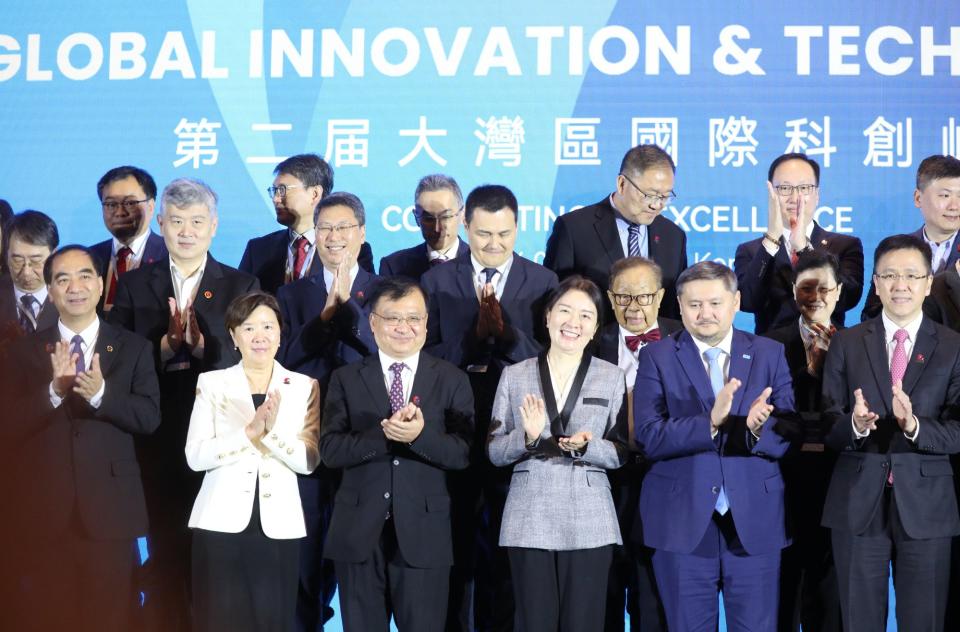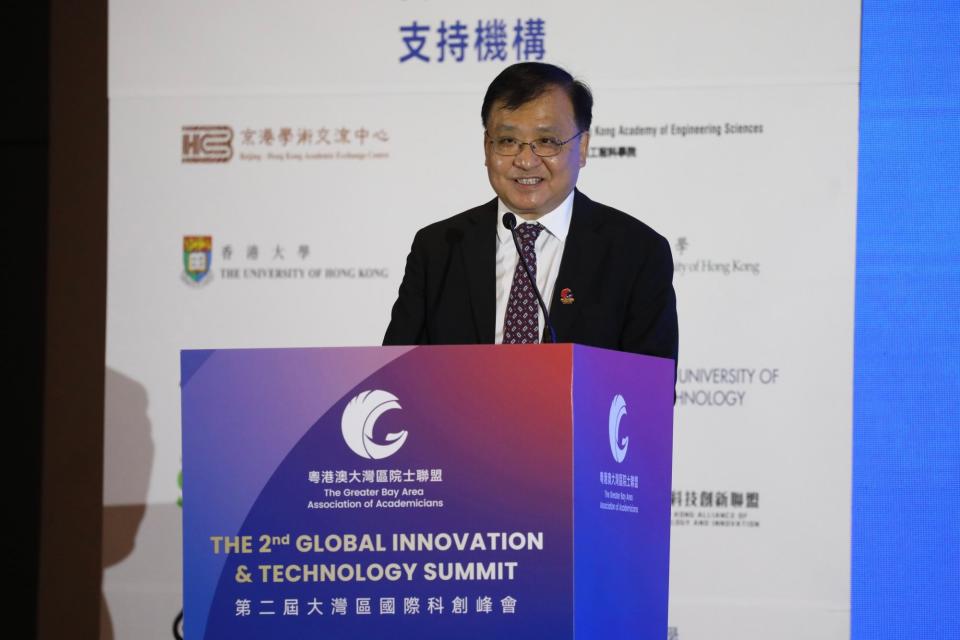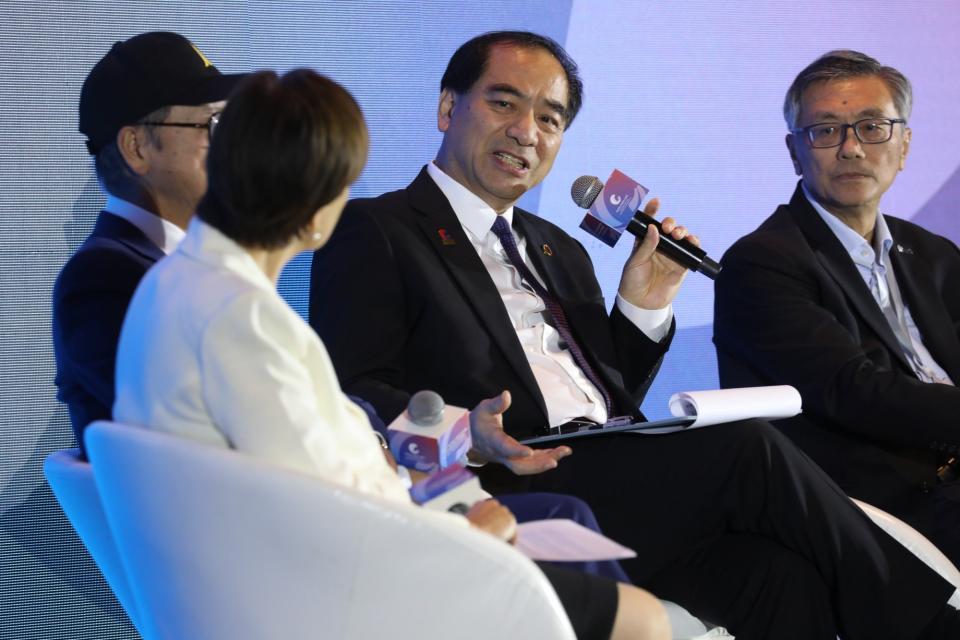Hong Kong pledges to step up expansion of innovation and technology talent pool, bolstering city's hi-tech hub ambitions
The Hong Kong government vows to accelerate the expansion of the city's international talent pool for innovation and technology amid mainland China's broader efforts to overcome sweeping hi-tech restrictions initiated by the United States.
Hong Kong's Secretary for Innovation, Technology and Industry, Sun Dong, pointed out that lofty goal in his speech on Wednesday at the 2nd Global Innovation & Technology Summit, organised by the Greater Bay Area Association of Academicians and held at the city's Science Park in Sha Tin.
"Young people are Hong Kong's future," Sun said. He affirmed that the government "has been very proactive" in its efforts to "nurture innovation and technology (I&T) talent, and enlarge the local talent pool", alongside the active participation of universities in grooming skilled people in research and development (R&D).
Do you have questions about the biggest topics and trends from around the world? Get the answers with SCMP Knowledge, our new platform of curated content with explainers, FAQs, analyses and infographics brought to you by our award-winning team.
He also cited how China's 14th five-year plan for 2021-25 supports the city's "development into an international I&T centre".

Some of the prominent speakers and guests at the 2nd Global Innovation & Technology Summit, held at the Hong Kong Science Park in Sha Tin, on April 3, 2024. Front row, from left: Peking University president Gong Qihuang; Hong Kong University of Science and Technology president Nancy Ip Yuk-yu, also Council Chair of the Greater Bay Area Association of Academicians; Fang Jianming, Deputy Commissioner of China's Ministry of Foreign Affairs in Hong Kong; Lu Xinning, Deputy Director of the Liaison Office of the Central People's Government in Hong Kong; Sayasat Nurbek, Minister of Science and Higher Education of the Republic of Kazakhstan; and Innovation, Technology and Industry Secretary Sun Dong. Photo: Sun Yeung alt=Some of the prominent speakers and guests at the 2nd Global Innovation & Technology Summit, held at the Hong Kong Science Park in Sha Tin, on April 3, 2024. Front row, from left: Peking University president Gong Qihuang; Hong Kong University of Science and Technology president Nancy Ip Yuk-yu, also Council Chair of the Greater Bay Area Association of Academicians; Fang Jianming, Deputy Commissioner of China's Ministry of Foreign Affairs in Hong Kong; Lu Xinning, Deputy Director of the Liaison Office of the Central People's Government in Hong Kong; Sayasat Nurbek, Minister of Science and Higher Education of the Republic of Kazakhstan; and Innovation, Technology and Industry Secretary Sun Dong. Photo: Sun Yeung>
"Being home to five of the world's top 100 universities, and numerous world-class experts and scholars, Hong Kong has access to the best resources available, forming a solid foundation and network for our journey to become an international I&T hub," Sun said.
That optimism reflects the Hong Kong government's sharpened focus on fostering the growth of exceptional I&T talent.
The city's STEM Internship Scheme, for example, encourages university students to participate in I&T-related work during their studies, so that they can pursue a career in that field after their graduation. In education, STEM stands for science, technology, engineering and maths.
The government's Technology Talent Admission Scheme already provides a fast-track arrangement for eligible companies to admit young mainland Chinese and overseas tech talent to undertake R&D work in the city. Last year, about 108 mainland talent moved to Hong Kong under that scheme, making up 87 per cent of all such admissions, according to Hong Kong government data.

Deputy Commissioner Fang Jianming, from the Office of the Commissioner of China's Ministry of Foreign Affairs in Hong Kong, speaks at the 2nd Global Innovation & Technology Summit, held at the Science Park in Sha Tin on April 3, 2024. Photo: Sun Yeung alt=Deputy Commissioner Fang Jianming, from the Office of the Commissioner of China's Ministry of Foreign Affairs in Hong Kong, speaks at the 2nd Global Innovation & Technology Summit, held at the Science Park in Sha Tin on April 3, 2024. Photo: Sun Yeung>
Hong Kong has also been providing resources for universities to conduct R&D, as well as support the commercialisation of their projects. In this year's Budget announcement, Sun said the government has doubled the maximum funding support to the Technology Transfer Office of each of the eight University Grants Committee-funded schools to US$16 million per year, strengthening technology transfer and marketing services.
At the same summit on Wednesday, Deputy Commissioner Fang Jianming, from the Office of the Commissioner of China's Ministry of Foreign Affairs in Hong Kong, lauded the city's universities for establishing a "comprehensive scientific research and development system, close international collaboration, and a sound intellectual property rights system".
"Hong Kong has the ability and responsibility to help China overcome 'neck-choking' technology weaknesses in important sectors," Fang said, citing the development of "new productive forces".
Chinese President Xi Jinping has referred to "new productive forces" as a combination of human labour, technology and infrastructure in various hi-tech sectors, including new-energy vehicles and commercial space flight.

Peking University president Gong Qihuang, centre, speaks during a panel discussion at the 2nd Global Innovation & Technology Summit at the Hong Kong Science Park in Sha Tin on April 3, 3024. Photo: Sun Yeung alt=Peking University president Gong Qihuang, centre, speaks during a panel discussion at the 2nd Global Innovation & Technology Summit at the Hong Kong Science Park in Sha Tin on April 3, 3024. Photo: Sun Yeung>
That phrase has also been written into the annual government work report, delivered by Chinese Premier Li Qiang in March, as the country's No 1 task to overcome the adverse effects of the US-China tech war.
Artificial intelligence (AI) was a recurring theme among speakers at the summit, as university presidents discussed adoption of the technology in academic institutions.
"New technologies, such as artificial intelligence ... bring significant impact and new opportunities to higher education," Peking University president Gong Qihuang said. He added that Peking University has introduced AI teaching assistants in some classes to enhance students' learning experience.
Meanwhile, the Education University of Hong Kong in the New Territories has partnered with Apple to establish a regional training centre for the company. This facility is expected to help the university's students develop skills in machine learning and generative AI tools, university vice-president May Cheng-hung said at the summit.
This article originally appeared in the South China Morning Post (SCMP), the most authoritative voice reporting on China and Asia for more than a century. For more SCMP stories, please explore the SCMP app or visit the SCMP's Facebook and Twitter pages. Copyright © 2024 South China Morning Post Publishers Ltd. All rights reserved.
Copyright (c) 2024. South China Morning Post Publishers Ltd. All rights reserved.

 Yahoo Finance
Yahoo Finance 